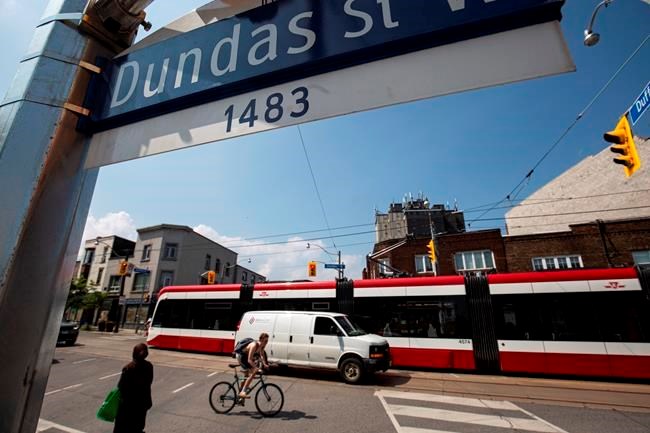TORONTO — Renewed focus on Canada's legacy of anti-Black racism has given fresh voice to calls for public officials to consider renaming monuments honouring the guardians of colonialism, including a street that stretches through much of the Greater Toronto Area.
Those seeking to rename Dundas Street, which crosses Toronto and numerous other southern Ontario cities, argue that street names and monuments should reflect present-day values rather than glorify the likes of Henry Dundas, an 18th-century politician who delayed Britain's abolition of slavery by 15 years.
"People take for granted that street names don't matter, but they do because they speak about our values," said Melanie Newton, a history professor at the University of Toronto. "They inscribe historical realities of power and privilege into the landscape that we move through every day."
She said such statues, schools, buildings and streets send a message not only to those who have been put on the margins, but to those who do the marginalizing.
"The argument that these monuments are there to remind us of inequality is nonsense," she said. "These monuments ... are there to remind people that whatever change happens, the kind of power and privilege that these people represent is still the foundation of the state and its structures and of the order of society.
"They are there to reassure those with power that even as society changes, they do not have to worry that their power will really be threatened."
As for the lack of knowledge about his role in perpetuating slavery in the British Empire, Newton said it's a symptom of a broader problem.
"It is not just an act of violence against Black students or Indigenous students — everybody is being miseducated about the origins of their own country in ways that impoverish us all," she said. "That we can walk down a street like Dundas and not realize what a terrible thing it is? We should not have to do that."
The issue of renaming streets and removing statues in Canada is hardly new. For instance, a statue of Halifax founder Edward Cornwallis, who put a bounty on Mi'kmaq scalps, was the subject of months of protests before eventually being removed from a city park in January 2018. Later that year, Victoria city council removed a statue of Canada's first prime minister, Sir John A. Macdonald, who was also an architect of the residential school system.
Deputy Prime Minister Chrystia Freeland said it's time for another national conversation on the topic.
"It's a conversation we need to have with racialized Canadians, with Indigenous people in Canada," she said. "It's a conversation we also need to have with historians and think very hard about what messages we want to be sending to Canadians today. I do think that this is a really important, a really complex issue and one that we need to work on and think about carefully together."
Likewise, Toronto Mayor John Tory said it was something that should be discussed and carefully considered, as an online petition calling for Dundas Street to be renamed garnered thousands of signatures on Wednesday.
Its organizer, local artist and activist Andrew Lochhead, said he was inspired to start the petition by a similar movement in Edinburgh, Scotland, where there are calls to tear down a statue of Dundas.
The leader of city council there said he would have "absolutely no sense of loss" if the Dundas statue was removed and replaced with something else.
Likewise, protesters in Bristol, England, on Sunday tore down a statue of 17th-century slave trader Edward Colston, rolled it to the harbour and plunged it into the sea.
Lochhead said it's particularly galling that Toronto would keep Dundas's name, given his negligible positive impact on Canada.
"Henry Dundas has very little if any impact on British North America other than the fact that he purposely obstructed the abolition of slavery and other than the fact he happened to be mates with John Graves Simcoe," he said. "Other than that the connection is pretty tenuous."
Ron Stagg, a professor of history at Ryerson University, agreed, saying that in this case, changing the name would not mean erasing a part of Canada's history. But in general, he said, removing such monuments altogether can be counterproductive.
"You don't want that person celebrated, but on the other hand, if you don't let people know about the person, you've lost the ability to educate them about the issues with historical figures," he said. "The key thing here is to look at each situation itself, not just let's get rid of everybody that did anything wrong."
He said statues and street names should be used as a learning opportunity.
"If you've got a school class and you go past a statue or you go to a statue intentionally, you can use that as an educational thing," Stagg said. "And particularly when you're dealing with public high school, secondary school students, this will set them up for the rest of their lives, giving them a lesson about the good and the bad in history."
But Newton, at U of T, was skeptical of that logic.
"I would question why people feel that they are so bad at their jobs that they need street names in order to educate people," she said. "That is what we are paid for."
This report by The Canadian Press was first published June 10, 2020.
Nicole Thompson, The Canadian Press



